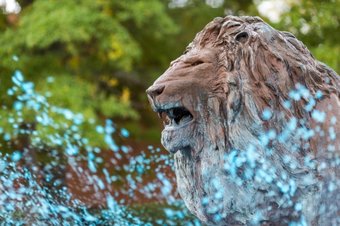Leadership Consultation for your organization or one-on-one coaching for Monarch LEAD Students
Sessions are free to ALL ODU students (Distance students can participate in the Leadership Lecture Series via WebEX) and student organizations during the Leadership Lecture Series. Other sessions can be scheduled; however there could be a cost to your organization.
Call 757-683-3919 to schedule a meeting for leadership development or email dmahlerr@odu.edu.
The Strong Interest Inventory® An Assessment of Personalities and Work Environments: Dionicia Mahler-Rogers Ph.D., Strong Certified Facilitator
The Strong Interest Inventory® assessment is the most widely used measure of career interests in the World. Join this session and explore your career options. Students who register for this session will receive a link to complete the Strong Interest Inventory® prior to the workshop date.
Understanding and developing your Emotional Intelligence (EI) can help you succeed in school, develop relationships, and navigate the challenges of life. EI refers to a distinct combination of emotional and social skills that influence your overall capability to cope effectively with the unique demands and pressures of school and life.
The EQ-i 2.0 will provide insight into:
- How you interact with others
- Your Self-confidence
- Expressing yourself
- Making tough decisions
- Dealing with stress
- Your general well-being
Prior to attending this session, participants take approximately 20 minutes of uninterrupted time to complete the instrument. Contact Dionicia Mahler-Rogers Pd.D., Certified EQ-I 2.0 facilitator to arrange access to the EQ-i 2.0. You must complete the questions in one sitting or the system will not save your answers and you will need to start over from the beginning.
Do you know what your "leadership style" is? If not, find out! This session will have the participants take a personal leadership inventory, called the DiSC. We will then explore the good, the bad and the ugly of each of the four styles and how leaders can best work with each type of leadership style. You are sure to have some "ah ha" moments in this interactive session!
The first step to leadership development is self-awareness. Participants take the Myers Briggs Type Inventory (MBTI) prior to attendance. During this session, you learn more about the behavior preferences and how you can utilize your knowledge of behavior preference to guide you to better leadership behaviors.
This workshop is designed to help participants:
- Understand the five conflict-handling modes of the TKI® assessment
- Increase their awareness of their own and others' conflict styles
- Develop skills for assessing conflict situations and selecting appropriate strategies for handling them
- Practice using different conflict modes
- Create an action plan for developing more effective conflict resolution skills
The Student Leadership Practice Inventory is a cornerstone of a powerful leadership development model, created by James M. Kouzes and Barry Z. Posner, authors of the book, The Leadership Challenge and The Student Leadership Challenge. This SLPI assessment is a quick and easy way for Leaders to rate themselves and begin to take action to improve their leadership performance.
Participation on your part includes doing the self-assessment and also asking five colleagues in your organization to complete the observer assessment on your behalf. Typically, it takes a Leader or Observer approximately 10-15 minutes to complete the 30-item assessments. This workshop includes a review of the behaviors and actions of exemplary leadership, identifying areas of improving your organization leadership practices, and identifying personal strengths as leaders. To assessment improvements, we also recommend re-doing this process about six months later.
Observer assessments are confidential and are submitted directly to your facilitator. You will have the opportunity to view all ratings; however individual observer names are not included. While this might make it difficult to follow up with individuals on specific ratings and scenarios, it is shown that a more accurate assessment is provided if it is confidential.
Dionicia Mahler-Rogers, CQ Certified Advanced Professional by the Cultural Intelligence Center, LLC.
Learn to use the strengths of all your team members to build a culturally competent team!
Developing Cultural Intelligence Workshop (CQ) Part I:
Participants get the opportunity to take the assessment prior to Part I. In part I, we review the 4 dimensions of CQ and strategies to effectively lead with CQ base on the review of individual profiles provided.
Participants will explore personal development and opportunities to change behavior.
During part II we review individual CQ profile.
Cultural Intelligence (CQ) Part II:
We will review the importance of Cultural Intelligence and explore cultural values. During this session, students will work in small groups and map cultural values.
Get Certified to perform Managerial Mediation by Dionicia Mahler-Rogers, Ph.D., Certified Workplace Mediator
Workplace Conflict Resolution
- Part I: Necessary Knowledge
- Part II: Third-Party Resolution
- Part II: Third-Party Resolution cont'd & Practice Mediation
Learning Objectives
- Gain conflict resolution skills and effective mediation techniques
- Gain understanding and skills in the strategic management of organizational conflict
Benefits of Attending
- Learn effective workplace conflict resolution strategies by utilizing MTI's Third-Party Resolution (Manager-as-Mediator).
- Get Equip with conflict resolution strategies you can use to reduce conflict in organizations.
- Certified to perform Managerial Mediation
Mediator & Trainer Program | Outline
- Third-Party Resolution
- Identifying the Nature of Conflict
- Discovering our wrong reflexes and the Retaliatory Cycle
- Understanding the Conciliatory Cycle and forces toward harmony
- Learning the steps of Third-Party Resolution
- Identifying when and how to use Third-Party Resolution
- Discovering how your own responses to conflict can help and hinder relationships
- Learning the 4-step self-mediation tool
- Gaining skills through practice (Successful Conflict Conversations)
- Weaving Mediation into the Fabric of Organizations
- Why we do what we do: Demystifying conflict behavior
- Thirst for Power: How power, rights and interest impact every conflict
- Paradigm Shift of the Professional Workplace Mediator
- Planning for mediation role-plays
- Gaining skills through practice (CDP Mock Feedback Sessions)
- Nudging Past Impasse
- Tips, Tricks and Personal Action Plans



